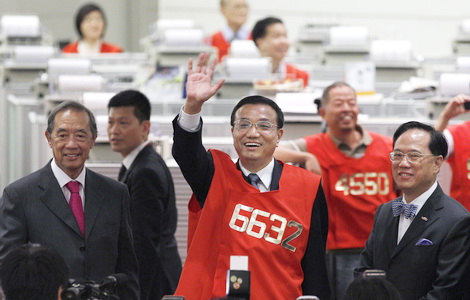-
News >Bizchina
Package unveiled to boost HK economy
2011-08-18 09:31?  Vice-Premier Li Keqiang waves during a visit to the Hong Kong Stock Exchange on Wednesday. Li was accompanied by Ronald Arculli (left), chairman of the exchange, and Hong Kong Chief Executive Donald Tsang. [Photo/Associated Press]
Vice-Premier Li Keqiang waves during a visit to the Hong Kong Stock Exchange on Wednesday. Li was accompanied by Ronald Arculli (left), chairman of the exchange, and Hong Kong Chief Executive Donald Tsang. [Photo/Associated Press]SAR's position as leading financial center strengthened as new RMB role beckons
HONG KONG - Vice-Premier Li Keqiang unveiled a package of measures on Wednesday to invigorate Hong Kong's economy, boost its role as a global financial center and help it develop as a leading offshore trading hub for the renminbi.
The measures will also encourage Hong Kong companies to invest directly on the mainland using the renminbi, and allow qualified foreign institutional investors (QFII) to buy mainland securities of up to 20 billion yuan ($3.12 billion), Li said.
This will eventually facilitate mainland-based financial institutions issuing yuan-denominated bonds in Hong Kong.
"Issuing renminbi treasury bonds in Hong Kong will be a long-term institutional arrangement of the central government," Li said.
"We will gradually increase the size of the bonds and work for the development and improvement of the renminbi bond market in Hong Kong."
It was the largest and most inclusive package announced since Premier Wen Jiabao's visit in 2003, when Hong Kong was hit by the SARS epidemic.
Li's comments came as the mainland sold its biggest yuan-denominated debt ever in the special administrative region (SAR) in a deal worth 20 billion yuan, giving depth to a market that reflects China's ambitions to internationalize the role of the renminbi.
Li announced details of the measures at a forum on the country's 12th Five-Year Plan (2011-2015) and financial and trade collaboration between the mainland and Hong Kong on the second day of his visit.
The measures include:
The mainland will open up the service trade (medical, construction and
other sectors) to Hong Kong;
Enhance Hong Kong's position as a global financial center;
Support the SAR to develop into an offshore renminbi center;
Help companies from Hong Kong and the mainland jointly explore overseas markets.
Li was giving people in Hong Kong "a morale boost" by providing a very clear direction for the region's development, said Rita Fan, a local member of the National People's Congress Standing Committee.
Donna Kwok, Greater China economist at HSBC, agreed.
"The measures should enhance Hong Kong's exposure to the mainland's growth momentum and help it against rising global economic headwinds," she said.
Li started a three-day visit to Hong Kong on Tuesday accompanied by a large and high-profile delegation that included central bank governor Zhou Xiaochuan and Minister of Commerce Chen Deming.
The unveiling of the measures was considered the highlight of the visit.
For the first time, the 12th Five-Year Plan includes a separate chapter on the development of Hong Kong, and the measures are part of the five-year program.
"It (the inclusion of Hong Kong) shows the central government's resolve to maintain the prosperity, stability and development of Hong Kong. The new five-year plan will bring immense opportunities to Hong Kong," Donald Tsang, chief executive of the Hong Kong SAR, said at the forum.
Li earlier praised Hong Kong as one of the world's most open, vibrant and competitive economies, and said Hong Kong's economy, in general, is sound.
Trade and investment between the mainland and Hong Kong are booming. Hong Kong has been the largest source of the mainland's foreign direct investment, and the mainland is Hong Kong's largest trade partner.
In 2003, the mainland and Hong Kong signed the Closer Economic Partnership Arrangement (CEPA).
During the past eight years, seven rounds of supplements have been added to the CEPA.
Under the CEPA framework, import tariffs on all goods made in Hong Kong have been exempted.
The mainland is promoting "the opening-up of the service trade" to Hong Kong, by discussing the "eighth round of supplements to the CEPA which are expected to be signed this year," Li said.
Medical, construction, legal and other services are set to benefit from the opening-up, and by the end of 2015 liberalization of the trade in services between the mainland and Hong Kong will be achieved.
"The new opening-up policy will give Hong Kong an opportunity to display the full range of its professional services," said Li Kui-wai, associate professor at the Department of Economics and Finance at City University of Hong Kong.
"The measures will vitalize the mechanism for the flow of the renminbi. Hong Kong can serve as a platform and an international financial hub for both mainland enterprises and overseas businesses seeking investment opportunities," said Benjamin Hung, chief executive officer of Standard Chartered Bank (Hong Kong).
